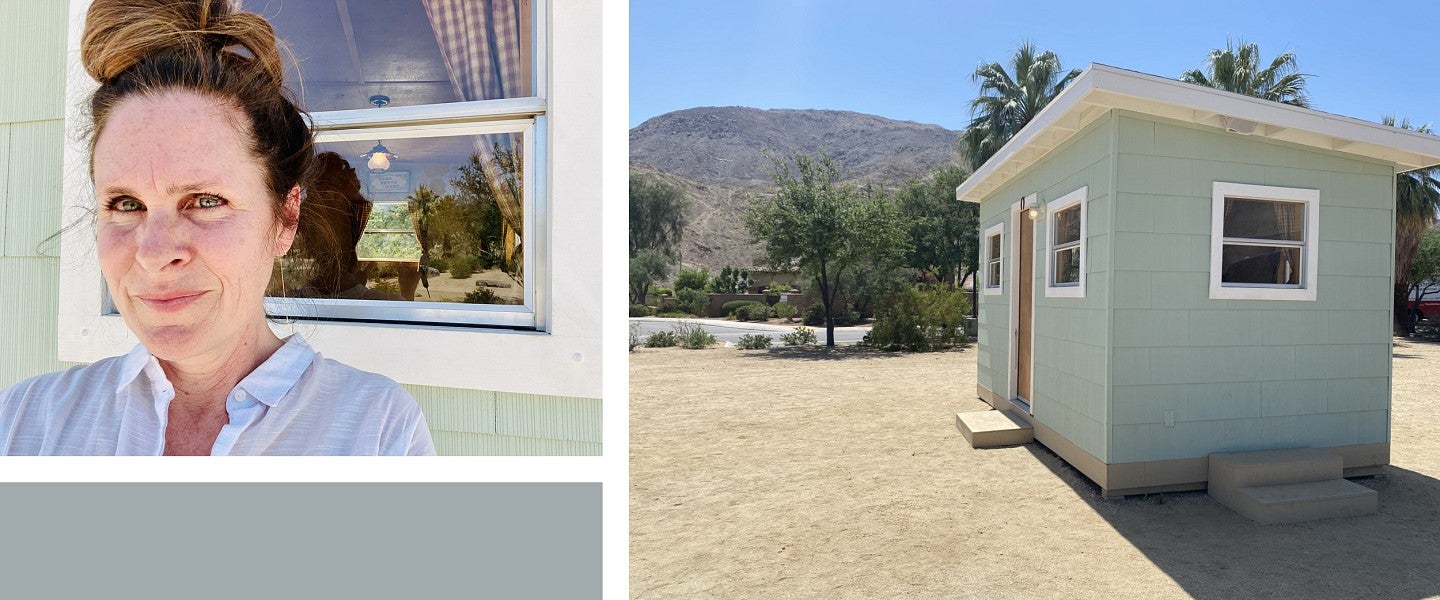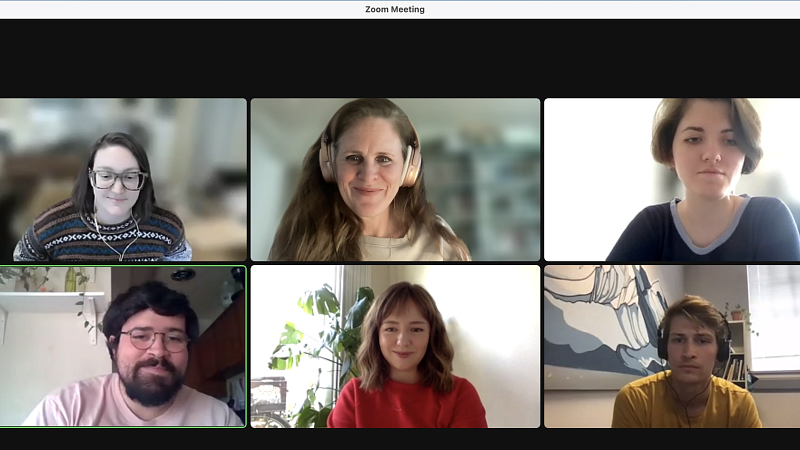
Emily Eliza Scott at Kim Stringfellow's Jackrabbit Homestead exhibit in Coachella Valley California.
Peering through a window, Emily Scott sees a bed, a nightstand and an embroidered “Home Sweet Home” decoration hanging on the wall. The structure is unoccupied — a replica of a homestead of the past. It is part of the Desert X art exhibition that Scott is covering in Coachella Valley, California. She lingers in a sliver of shade before moving to the next window. There, she sees a stove and a desk topped with a vintage turquoise typewriter. Even in this simple setting, it’s amazing how a small shift in vantage points can change one’s view.
*****
Seeing something and then looking again from a different angle is central to Scott’s work. She walks around subjects both physically and metaphorically, considering how they morph from each perspective. Often, she invites others to join her — to share their views — and then looks back, searching for more.
Scott is an Assistant Professor at the University of Oregon. She holds a dual post, teaching Art History and Environmental Studies classes. Before entering academia, she worked for 10 years as a park ranger in Glacier Bay National Park in Alaska; Arches and Canyonlands National Parks in Utah; and Black Canyon National Park in Colorado.
“I had issues with certain ways that nature was being framed and/or wilderness was being celebrated in national parks, but I didn't have a language for it,” said Scott. She pursued her PhD in Art History with a minor in Cultural Geography at the University of California, Los Angeles, to find clarity and now helps students at UO work through their own questions around nature, art, and representation.
As part of her work, Scott advises a group of graduate students specialized in the same type of interdisciplinary studies that informed her own PhD. When COVID hit, Scott saw how the shift to remote learning severed connections between departments and students. She remembered a workshop that one of her mentors at UCLA had established and decided to launch a similar remote model to bring her advisees together.
“It started at the beginning of the pandemic as a way to combat the sense of isolation that many graduate students felt,” said Scott. “It's often isolating to be a grad student anyway, but certainly during a pandemic.”
The group meets every few weeks over Zoom. Members take turns moderating the sessions and propose different topics and activities for each meeting. Sometimes they read and discuss articles, other times they review and provide feedback on each other’s work.
Raechel Root, a PhD candidate in Art History, has been involved since the group’s inception. “It feels like a safe space to try out ideas,” she said. “A lot of times, we will test our presentations before going to a conference. It's so rare to get to practice a conference presentation, get feedback and then keep working on it.”
About six to eight students participate in each meeting. Some are starting their programs and others are preparing for the job market. During the sessions, students also discuss challenges not covered by curricula.

Root (bottom center) and Scott (top center) participate in a monthly meeting.
“We share a lot of knowledge from our different vantage points with each other,” said Scott. “It gives a chance for people to ask questions and process things together that often, in grad school, one is meant to magically figure out on their own or learn by osmosis.”
Students also build capacity to manage new obstacles and advise each other. Root said Scott sheds her professor role in the meetings and instead “lets us teach each other by encouraging us to give each other feedback, encouraging us to organize the group.”
Even though many pandemic restrictions have lifted, the group is still going strong. One of the original members, a former Environmental Studies master’s student, has since graduated and now joins from New York City where she’s pursuing her PhD.
Scott attributes the group’s staying power to the energy that is created through connection and hearing the perspectives of others. “It has rejuvenated me so much,” she said. “The conversations with this group continue to be a real bright spot in my career at UO.”
*****
Learn more about Emily Eliza Scott on the University of Oregon website and Academia.
—By Claire Shanley, Division of Graduate Studies
